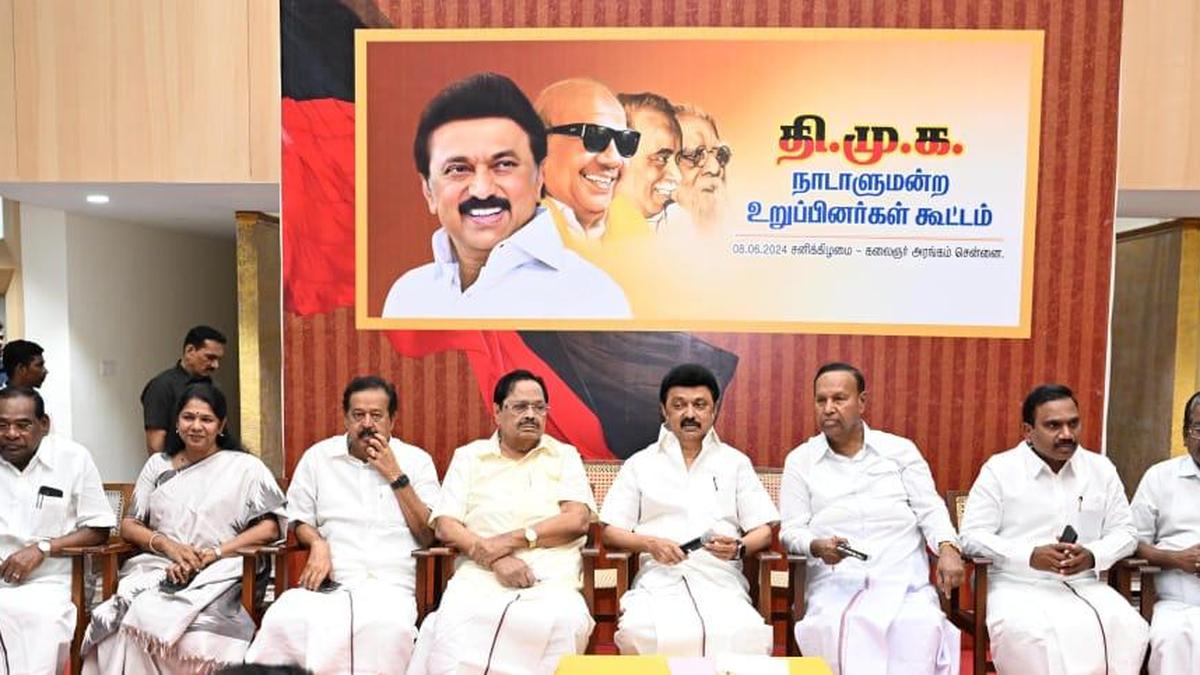
DMK MPs urge Nitish Kumar and Chandrababu Naidu to advise Centre against NEET
The Hindu
A meeting of the newly-elected DMK MPs, on Saturday, demanded that the Centre abolish NEET in the wake of large scale irregularities in the conduct of examination for admission to medical courses.
A meeting of the newly-elected DMK MPs, on Saturday, demanded that the Centre abolish NEET in the wake of large scale irregularities in the conduct of examination for admission to medical courses.
A resolution adopted in the meeting chaired by Chief Minister M.K. Stalin urged Bihar Chief Minister Nitish Kumar and Telugu Desam Party leader Chandrababu Naidu, the alliance partners of the BJP, to consider the plea and advise the Centre to abolish the test.
“States that seek exemption from NEET should be allowed to dispense with the test. We will raise the issue in Parliament,” said a resolution. The meeting was also attended by DMK’s Rajya Sabha members.
Another resolution condemned the Centre’s decision to involve the Central Industrial Security Force (CISF) instead of Parliament Security Service (PSS) for security of the Parliament complex. “The Parliament belongs to the MPs who are elected by the people. There is a lot of difference between security arrangements in public places and the Parliament. The PSS cadre are trained to identify and deal with current and former members of the Parliament. Handing over the task to the CISF will create a lot of difficulties,” the resolution warned.
The meeting also condemned the removal of the statues of Mahatma Gandhi and B.R. Ambedkar from the Parliament complex and urged the government to restore them in the same place.
Yet another resolution said the people of Tamil Nadu had defeated the BJP in the Lok Sabha poll since the government at the Centre had failed to compensate the State for the loss from GST, allot adequate funds for the Metro Rail Project and construct the building for AIIMS in Madurai.
“Tamil Nadu was not given its due in central schemes and railway projects. The Centre remained indifferent to the State of Tamil Nadu and the Tamil language. The Governor of the State constantly created problems for the State government and the Centre had treated Tamil people as secondary citizens,” the resolution alleged.

“Writing, in general, is a very solitary process,” says Yauvanika Chopra, Associate Director at The New India Foundation (NIF), which, earlier this year, announced the 12th edition of its NIF Book Fellowships for research and scholarship about Indian history after Independence. While authors, in general, are built for it, it can still get very lonely, says Chopra, pointing out that the fellowship’s community support is as valuable as the monetary benefits it offers. “There is a solid community of NIF fellows, trustees, language experts, jury members, all of whom are incredibly competent,” she says. “They really help make authors feel supported from manuscript to publication, so you never feel like you’re struggling through isolation.”

Several principals of government and private schools in Delhi on Tuesday said the Directorate of Education (DoE) circular from a day earlier, directing schools to conduct classes in ‘hybrid’ mode, had caused confusion regarding day-to-day operations as they did not know how many students would return to school from Wednesday and how would teachers instruct in two modes — online and in person — at once. The DoE circular on Monday had also stated that the option to “exercise online mode of education, wherever available, shall vest with the students and their guardians”. Several schoolteachers also expressed confusion regarding the DoE order. A government schoolteacher said he was unsure of how to cope with the resumption of physical classes, given that the order directing government offices to ensure that 50% of the employees work from home is still in place. On Monday, the Commission for Air Quality Management in the National Capital Region and Adjoining Areas (CAQM) had, on the orders of the Supreme Court, directed schools in Delhi-NCR to shift classes to the hybrid mode, following which the DoE had issued the circular. The court had urged the Centre’s pollution watchdog to consider restarting physical classes due to many students missing out on the mid-day meals and lacking the necessary means to attend classes online. The CAQM had, on November 20, asked schools in Delhi-NCR to shift to the online mode of teaching.









